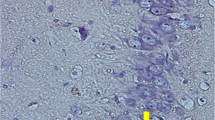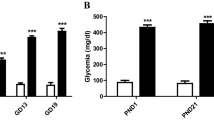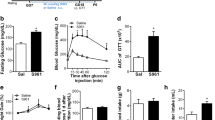Abstract
Diabetes during pregnancy causes a wide range of neurodevelopmental and neurocognitive abnormalities in offspring. Glycogen synthase kinase-3 (GSK-3) is widely expressed during brain development and regulates multiple cellular processes, and its dysregulation is implicated in the pathogenesis of diverse neurodegenerative and psychological diseases. This study was designed to examine the effects of maternal diabetes on GSK-3β messenger RNA (mRNA) expression and phosphorylation in the developing rat hippocampus. Female rats were maintained diabetic from a week before pregnancy through parturition, and male offspring was killed immediately after birth. We found a significant bilateral upregulation of GSK-3β mRNA expression in the hippocampus of pups born to diabetic mothers at P0, compared to controls. Moreover, at the same time point, there was a marked bilateral increase in the phosphorylation level of GSK-3β in the diabetic group. Unlike phosphorylation levels, there was a significant upregulation in hippocampal GSK-3β mRNA expression in the insulin-treated group, when compared to controls. The present study revealed that diabetes during pregnancy strongly influences the regulation of GSK-3β in the right/left developing hippocampi. These dysregulations may be part of the cascade of events through which diabetes during pregnancy affects the newborn’s hippocampal structure and function.


Similar content being viewed by others
References
Aberle H, Bauer A, Stappert J, Kispert A, Kemler R (1997) Beta-catenin is a target for the ubiquitin-proteasome pathway. EMBO J 16:3797–3804
Ali A, Hoeflich KP, Woodgett JR (2001) Glycogen synthase kinase-3: properties, functions, and regulation. Chem Rev 101:2527–2540
Beals CR, Sheridan CM, Turck CW, Gardner P, Crabtree GR (1997) Nuclear export of NF-ATc enhanced by glycogen synthase kinase-3. Science 275:1930–1934
Beaulieu JM, Zhang X, Rodriguiz RM, Sotnikova TD, Cools MJ, Wetsel WC, et al. (2008) Role of GSK3 beta in behavioral abnormalities induced by serotonin deficiency. Proc Natl Acad Sci U S A 105:1333–1338
Beaulieu JM, Gainetdinov RR, Caron MG (2009) Akt/GSK3 signaling in the action of psychotropic drugs. Annu Rev Pharmacol Toxicol 49:327–347
Becerra JE, Khoury MJ, Cordero JF, Erickson JD (1990) Diabetes mellitus during pregnancy and the risks for specific birth defects: a population-based case-control study. Pediatrics 85:1–9
Bradley CA, Peineau S, Taghibiglou C, Nicolas CS, Whitcomb DJ, Bortolotto ZA, et al. (2012) A pivotal role of GSK-3 in synaptic plasticity. Front Mol Neurosci 5:13
Cederberg J, Picard JJ, Eriksson UJ (2003) Maternal diabetes in the rat impairs the formation of neural-crest derived cranial nerve ganglia in the offspring. Diabetologia 46:1245–1251
Chang TI, Horal M, Jain SK, Wang F, Patel R, Loeken MR (2003) Oxidant regulation of gene expression and neural tube development: insights gained from diabetic pregnancy on molecular causes of neural tube defects. Diabetologia 46:538–545
Cohen P, Goedert M (2004) GSK3 inhibitors: development and therapeutic potential. Nat Rev Drug Discov 3:479–487
Cook D, Fry MJ, Hughes K, Sumathipala R, Woodgett JR, Dale TC (1996) Wingless inactivates glycogen synthase kinase-3 via an intracellular signalling pathway which involves a protein kinase C. EMBO J 15:4526–4536
Cross DA, Alessi DR, Vandenheede JR, McDowell HE, Hundal HS, Cohen P (1994) The inhibition of glycogen synthase kinase-3 by insulin or insulin-like growth factor 1 in the rat skeletal muscle cell line L6 is blocked by wortmannin, but not by rapamycin: evidence that wortmannin blocks activation of the mitogen-activated protein kinase pathway in L6 cells between Ras and Raf. Biochem J 303(Pt 1):21–26
Cross DA, Alessi DR, Cohen P, Andjelkovich M, Hemmings BA (1995) Inhibition of glycogen synthase kinase-3 by insulin mediated by protein kinase B. Nature 378:785–789
de Groot RP, Auwerx J, Bourouis M, Sassone-Corsi P (1993) Negative regulation of Jun/AP-1: conserved function of glycogen synthase kinase 3 and the Drosophila kinase shaggy. Oncogene 8:841–847
DeCarolis NA, Eisch AJ (2010) Hippocampal neurogenesis as a target for the treatment of mental illness: a critical evaluation. Neuropharmacology 58:884–893
Ding VW, Chen RH, McCormick F (2000) Differential regulation of glycogen synthase kinase 3beta by insulin and Wnt signaling. J Biol Chem 275:32475–32481
Eidelman AI, Samueloff A (2002) The pathophysiology of the fetus of the diabetic mother. Semin Perinatol 26:232–236
Escobar M.L., and Derrick B. (2007) Long-term potentiation and depression as putative mechanisms for memory formation. 21204430.
Forster E, Zhao S, Frotscher M (2006) Laminating the hippocampus. Nat Rev Neurosci 7:259–267
Frame S, Cohen P (2001) GSK3 takes centre stage more than 20 years after its discovery. Biochem J 359:1–16
Fu J, Tay SS, Ling EA, Dheen ST (2006) High glucose alters the expression of genes involved in proliferation and cell-fate specification of embryonic neural stem cells. Diabetologia 49:1027–1038
Fuentealba LC, Eivers E, Ikeda A, Hurtado C, Kuroda H, Pera EM, et al. (2007) Integrating patterning signals: Wnt/GSK3 regulates the duration of the BMP/Smad1 signal. Cell 131:980–993
Gao Q, Gao YM (2007) Hyperglycemic condition disturbs the proliferation and cell death of neural progenitors in mouse embryonic spinal cord. Int J Dev Neurosci 25:349–357
Garrido JJ, Simon D, Varea O, Wandosell F (2007) GSK3 alpha and GSK3 beta are necessary for axon formation. FEBS Lett 581:1579–1586
Georgieff MK (2006) The effect of maternal diabetes during pregnancy on the neurodevelopment of offspring. Minn Med 89:44–47
Gomez de Barreda E, Perez M, Gomez RP, de Cristobal J, Martin-Maestro P, Moran A, et al. (2010) Tau-knockout mice show reduced GSK3-induced hippocampal degeneration and learning deficits. Neurobiol Dis 37:622–629
Grimes CA, Jope RS (2001a) CREB DNA binding activity is inhibited by glycogen synthase kinase-3 beta and facilitated by lithium. J Neurochem 78:1219–1232
Grimes CA, Jope RS (2001b) The multifaceted roles of glycogen synthase kinase 3beta in cellular signaling. Prog Neurobiol 65:391–426
Hami J, Sadr-Nabavi A, Sankian M, Balali-Mood M, Haghir H (2013) The effects of maternal diabetes on expression of insulin-like growth factor-1 and insulin receptors in male developing rat hippocampus. Brain Struct Funct 218:73–84
Hami J, Shojae F, Vafaee-Nezhad S, Lotfi N, Kheradmand H, Haghir H (2015) Some of the experimental and clinical aspects of the effects of the maternal diabetes on developing hippocampus. World J Diabetes 6:412–422
Hernandez F, de Barreda EG, Fuster-Matanzo A, Goni-Oliver P, Lucas JJ, Avila J (2009) The role of GSK3 in Alzheimer disease. Brain Res Bull 80:248–250
Hooper C, Markevich V, Plattner F, Killick R, Schofield E, Engel T, et al. (2007) Glycogen synthase kinase-3 inhibition is integral to long-term potentiation. Eur J Neurosci 25:81–86
Hur EM, Zhou FQ (2010) GSK3 signaling in neural development. Nat Rev Neurosci 11:539–551
Jawerbaum A, White V (2010) Animal models in diabetes and pregnancy. Endocr Rev 31:680–701
Johnson-Farley NN, Travkina T, Cowen DS (2006) Cumulative activation of akt and consequent inhibition of glycogen synthase kinase-3 by brain-derived neurotrophic factor and insulin-like growth factor-1 in cultured hippocampal neurons. J Pharmacol Exp Ther 316:1062–1069
Jolivalt CG, Lee CA, Beiswenger KK, Smith JL, Orlov M, Torrance MA, et al. (2008) Defective insulin signaling pathway and increased glycogen synthase kinase-3 activity in the brain of diabetic mice: parallels with Alzheimer’s disease and correction by insulin. J Neurosci Res 86:3265–3274
Jope RS, Roh MS (2006) Glycogen synthase kinase-3 (GSK3) in psychiatric diseases and therapeutic interventions. Curr Drug Targets 7:1421–1434
Karunanayake EH, Hearse DJ, Mellows G (1976) Streptozotocin: its excretion and metabolism in the rat. Diabetologia 12:483–488
Kim WY, Snider WD (2011) Functions of GSK-3 signaling in development of the nervous system. Front Mol Neurosci 4:44
Kim WY, Wang X, Wu Y, Doble BW, Patel S, Woodgett JR, et al. (2009) GSK-3 is a master regulator of neural progenitor homeostasis. Nat Neurosci 12:1390–1397
Kimura T, Yamashita S, Nakao S, Park JM, Murayama M, Mizoroki T, et al. (2008) GSK-3beta is required for memory reconsolidation in adult brain. PLoS ONE 3:e3540
Klugmann M, Schwab MH, Puhlhofer A, Schneider A, Zimmermann F, Griffiths IR, et al. (1997) Assembly of CNS myelin in the absence of proteolipid protein. Neuron 18:59–70
Kockeritz L, Doble B, Patel S, Woodgett JR (2006) Glycogen synthase kinase-3—an overview of an over-achieving protein kinase. Curr Drug Targets 7:1377–1388
Lau KF, Miller CC, Anderton BH, Shaw PC (1999) Expression analysis of glycogen synthase kinase-3 in human tissues. J Pept Res 54:85–91
Lei P, Ayton S, Bush AI, Adlard PA (2011) GSK-3 in neurodegenerative diseases. Int J Alzheimers Dis 2011:189246
Leroy K, Brion JP (1999) Developmental expression and localization of glycogen synthase kinase-3beta in rat brain. J Chem Neuroanat 16:279–293
Loeken MR (2005) Current perspectives on the causes of neural tube defects resulting from diabetic pregnancy. Am J Med Genet C: Semin Med Genet 135C:77–87
Lopes C.D., Sinigaglia-Coimbra R., Mazzola J., Camano L., and Mattar R. (2011) Neurofunctional evaluation of young male offspring of rat dams with diabetes induced by streptozotocin. ISRN Endocrinol.
Lovestone S, Killick R, Di Forti M, Murray R (2007) Schizophrenia as a GSK-3 dysregulation disorder. Trends Neurosci 30:142–149
Ma YC, Song MR, Park JP, Henry Ho HY, Hu L, Kurtev MV, et al. (2008) Regulation of motor neuron specification by phosphorylation of neurogenin 2. Neuron 58:65–77
McNay EC, Fries TM, Gold PE (2000) Decreases in rat extracellular hippocampal glucose concentration associated with cognitive demand during a spatial task. Proc Natl Acad Sci U S A 97:2881–2885
Neal JW, Clipstone NA (2001) Glycogen synthase kinase-3 inhibits the DNA binding activity of NFATc. J Biol Chem 276:3666–3673
Nelson CA, Wewerka S, Thomas KM, Tribby-Walbridge S, deRegnier R, Georgieff M (2000) Neurocognitive sequelae of infants of diabetic mothers. Behav Neurosci 114:950–956
O’Brien WT, Harper AD, Jove F, Woodgett JR, Maretto S, Piccolo S, et al. (2004) Glycogen synthase kinase-3beta haploinsufficiency mimics the behavioral and molecular effects of lithium. J Neurosci 24:6791–6798
Ornoy A (2005) Growth and neurodevelopmental outcome of children born to mothers with pregestational and gestational diabetes. Pediatr Endocrinol Rev 3:104–113
Ornoy A, Ratzon N, Greenbaum C, Peretz E, Soriano D, Dulitzky M (1998) Neurobehaviour of school age children born to diabetic mothers. Arch Dis Child Fetal Neonatal Ed 79:F94–F99
Pap M, Cooper GM (1998) Role of glycogen synthase kinase-3 in the phosphatidylinositol 3-kinase/Akt cell survival pathway. J Biol Chem 273:19929–19932
Peineau S, Taghibiglou C, Bradley C, Wong TP, Liu L, Lu J, et al. (2007) LTP inhibits LTD in the hippocampus via regulation of GSK3beta. Neuron 53:703–717
Peineau S, Bradley C, Taghibiglou C, Doherty A, Bortolotto ZA, Wang YT, et al. (2008) The role of GSK-3 in synaptic plasticity. Br J Pharmacol 153(Suppl 1):S428–S437
Rizzo T, Metzger BE, Burns WJ, Burns K (1991) Correlations between antepartum maternal metabolism and child intelligence. N Engl J Med 325:911–916
Salcedo-Tello P, Ortiz-Matamoros A, Arias C (2011) GSK3 function in the brain during development, neuronal plasticity, and neurodegeneration. Int J Alzheimers Dis 2011:189728
Schwartz R, Teramo KA (2000) Effects of diabetic pregnancy on the fetus and newborn. Semin Perinatol 24:120–135
Stenninger E, Flink R, Eriksson B, Sahlen C (1998) Long-term neurological dysfunction and neonatal hypoglycaemia after diabetic pregnancy. Arch Dis Child Fetal Neonatal Ed 79:F174–F179
Styrud J, Thunberg L, Nybacka O, Eriksson UJ (1995) Correlations between maternal metabolism and deranged development in the offspring of normal and diabetic rats. Pediatr Res 37:343–353
Takashima A (2006) GSK-3 is essential in the pathogenesis of Alzheimer’s disease. J Alzheimers Dis 9:309–317
Thompson CL, Pathak SD, Jeromin A, Ng LL, MacPherson CR, Mortrud MT, et al. (2008) Genomic anatomy of the hippocampus. Neuron 60:1010–1021
Van Lieshout RJ, Voruganti LP (2008) Diabetes mellitus during pregnancy and increased risk of schizophrenia in offspring: a review of the evidence and putative mechanisms. J Psychiatry Neurosci 33:395–404
Welsh GI, Proud CG (1993) Glycogen synthase kinase-3 is rapidly inactivated in response to insulin and phosphorylates eukaryotic initiation factor eIF-2B. Biochem J 294(Pt 3):625–629
Woodgett JR (1990) Molecular cloning and expression of glycogen synthase kinase-3/factor A. EMBO J 9:2431–2438
Woodgett JR (2001) Judging a protein by more than its name: GSK-3. Sci STKE 2001:re12
Yamauchi K, Kurosaka A (2009) Inhibition of glycogen synthase kinase-3 enhances the expression of alkaline phosphatase and insulin-like growth factor-1 in human primary dermal papilla cell culture and maintains mouse hair bulbs in organ culture. Arch Dermatol Res 301:357–365
Yao HB, Shaw PC, Wong CC, Wan DC (2002) Expression of glycogen synthase kinase-3 isoforms in mouse tissues and their transcription in the brain. J Chem Neuroanat 23:291–297
Zhou FQ, Snider WD (2005) Cell biology. GSK-3beta and microtubule assembly in axons. Science 308:211–214
Zhou J, Wang L, Ling S, Zhang X (2007) Expression changes of growth-associated protein-43 (GAP-43) and mitogen-activated protein kinase phosphatase-1 (MKP-1) and in hippocampus of streptozotocin-induced diabetic cognitive impairment rats. Exp Neurol 206:201–208
Zhu LQ, Wang SH, Liu D, Yin YY, Tian Q, Wang XC, et al. (2007) Activation of glycogen synthase kinase-3 inhibits long-term potentiation with synapse-associated impairments. J Neurosci 27:12211–12220
Acknowledgments
This paper is based on the results of Razieh Karimi M.Sc. thesis (No. A-529) which financially was supported by a Mashhad University of Medical Sciences (MUMS) grant.
Conflict of Interest
The authors declare that they have no competing interests.
Author information
Authors and Affiliations
Corresponding author
Additional information
Javad Hami and Razieh Karimi contributed equally to this work.
Rights and permissions
About this article
Cite this article
Hami, J., Karimi, R., Haghir, H. et al. Diabetes in Pregnancy Adversely Affects the Expression of Glycogen Synthase Kinase-3β in the Hippocampus of Rat Neonates. J Mol Neurosci 57, 273–281 (2015). https://doi.org/10.1007/s12031-015-0617-3
Received:
Accepted:
Published:
Issue Date:
DOI: https://doi.org/10.1007/s12031-015-0617-3




